Self-care is any activity or practice that we deliberately engage in to promote our physical, mental, and emotional well-being. It is an essential aspect of maintaining good health and reducing stress levels. Here are some types of self-care you need to know.
- Physical Self-Care
- Emotional Self-Care
- Intellectual Self-Care
- Social Self-Care
- Spiritual Self-Care
- Professional Self-Care
Here is a list of self-care activities you can try:
- Take a relaxing bath or shower.
- Go for a walk in nature.
- Practice mindfulness meditation.
- Get a massage.
- Practice yoga or stretching exercises.
- Spend time with loved ones.
- Engage in a creative activity like drawing, painting or writing.
- Listen to calming music or nature sounds.
- Practice deep breathing exercises.
- Try aromatherapy with essential oils.
- Get enough sleep and establish a regular sleep routine.
- Eat a healthy, balanced diet and stay hydrated.
- Treat yourself to a healthy snack or drink.
- Spend time in the sun and get some vitamin D.
- Engage in a hobby that brings you joy.
Remember, self-care is unique to each individual, so it’s important to find the activities that work best for you and make them a regular part of your routine.
Regenerate response
Physical Self-Care
This type of self-care involves taking care of your physical health by engaging in activities that promote physical well-being. Examples include getting enough sleep, exercising regularly, eating a healthy diet, staying hydrated, and practicing good hygiene.
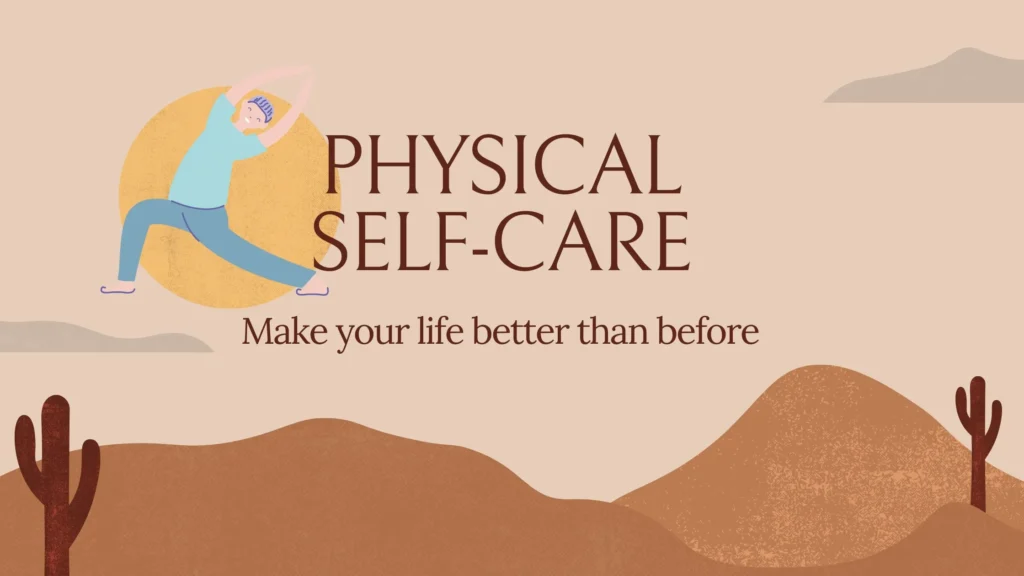
Yes, that is correct. Physical self-care refers to the practice of taking care of your physical health and well-being. It involves engaging in activities that promote physical well-being, such as getting enough sleep, regular exercise, maintaining a healthy diet, staying hydrated, and practicing good hygiene.
Physical self-care is essential for maintaining good health and preventing illness. By taking care of your physical health, you can reduce your risk of developing chronic diseases such as diabetes, heart disease, and obesity. It can also help improve your mental health by reducing stress and promoting relaxation.
Incorporating physical self-care into your daily routine is an important step towards maintaining overall health and well-being. It can be as simple as taking a brisk walk, drinking enough water, or getting enough sleep. By prioritizing physical self-care, you can improve your quality of life and enhance your ability to cope with the challenges and stresses of daily life.
Emotional Self-Care
Emotional self-care involves taking care of your emotional well-being. This can include engaging in activities that help you manage stress, practicing mindfulness and meditation, spending time with loved ones, seeking therapy or counseling, and practicing self-compassion.
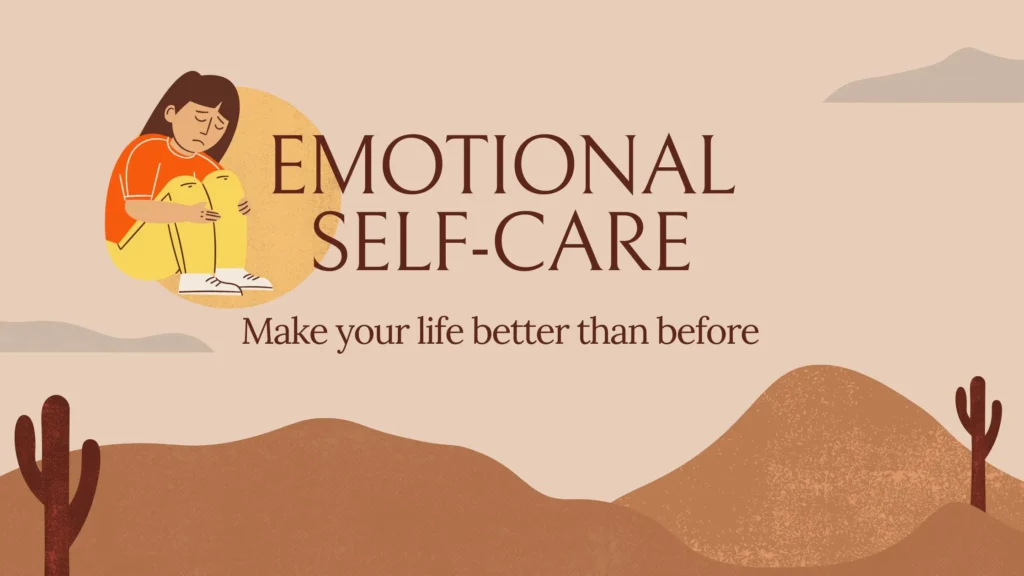
Yes, that’s correct! Emotional self-care involves taking care of your emotional and mental well-being. It involves activities that help you manage stress, process your emotions, and promote a sense of inner calm and balance.
Examples of emotional self-care activities include practicing mindfulness and meditation, spending time in nature, engaging in hobbies and interests, seeking support from loved ones, seeking professional help from a therapist or counselor, practicing self-compassion and self-forgiveness, and setting healthy boundaries.
Emotional self-care is essential for maintaining good mental health, reducing anxiety and depression, and improving overall well-being. It helps you become more aware of your thoughts and emotions, and learn how to manage them in healthy ways. By prioritizing emotional self-care, you can improve your relationships with others, increase your resilience to stress, and enhance your ability to cope with life’s challenges.
Intellectual Self-Care
This type of self-care involves engaging in activities that stimulate your mind and keep you intellectually challenged. Examples include reading, learning a new skill, taking classes, and engaging in hobbies that require mental effort.
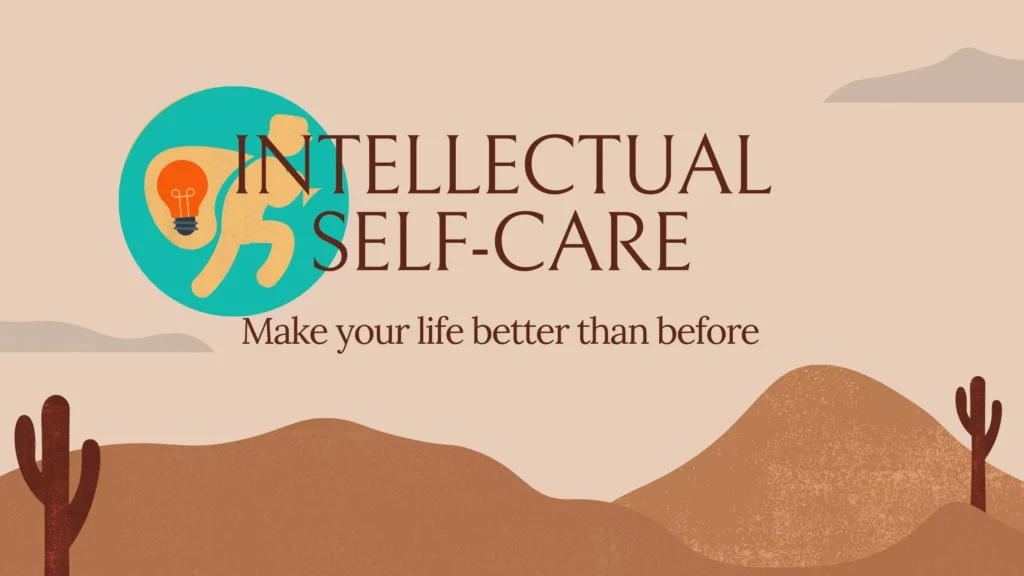
Yes, that’s correct! Intellectual self-care is an important aspect of self-care that involves engaging in activities that stimulate your mind, challenge your intellect, and promote lifelong learning.
Examples of intellectual self-care activities include reading books, taking classes or workshops, learning a new language, engaging in intellectual hobbies such as puzzles, board games or crosswords, attending cultural events such as museums or concerts, or even engaging in stimulating conversations with others.
Intellectual self-care is important because it helps keep your brain active, sharp, and engaged, which can help prevent cognitive decline, improve memory and concentration, and boost overall cognitive function. Additionally, engaging in intellectually stimulating activities can provide a sense of fulfillment, enhance creativity and problem-solving skills, and increase confidence and self-esteem.
Incorporating intellectual self-care into your routine can be a fun and rewarding way to expand your knowledge and skills, challenge yourself, and improve your overall well-being.
Social Self-Care
Social self-care involves connecting with others and building strong relationships. Examples include spending time with friends and family, joining clubs or organizations, volunteering, and participating in group activities.
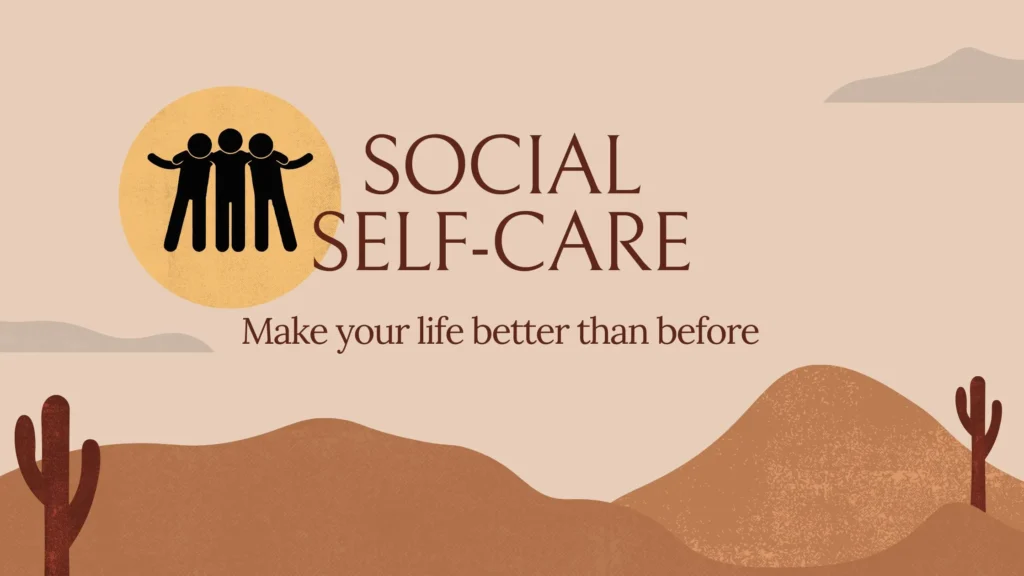
Yes, that’s correct! Social self-care is an important aspect of self-care that involves connecting with others and building strong relationships.
Examples of social self-care activities include spending time with loved ones, joining social groups or organizations, volunteering, attending social events or gatherings, and engaging in group activities such as sports or hobbies.
Social self-care is important because humans are social beings and need meaningful connections with others in order to thrive. Strong social support can help reduce stress, improve mental health, and increase overall happiness and well-being. Additionally, engaging in social activities can provide a sense of belonging, enhance communication and interpersonal skills, and even lead to new opportunities and experiences.
Incorporating social self-care into your routine can be a fun and rewarding way to connect with others, build relationships, and improve your overall well-being. Whether it’s spending time with loved ones or making new friends through social activities, prioritizing social self-care can have a positive impact on your life.
Spiritual Self-Care
Spiritual self-care involves nurturing your spiritual well-being and finding meaning and purpose in your life. Examples include practicing meditation or prayer, spending time in nature, engaging in spiritual practices, and participating in religious or spiritual communities.

Yes, that’s correct! Spiritual self-care involves nurturing your spiritual well-being and finding meaning, purpose, and connection in your life.
Examples of spiritual self-care activities include practicing meditation or prayer, spending time in nature, engaging in spiritual practices such as yoga or tai chi, participating in religious or spiritual communities, reading spiritual texts or literature, or engaging in self-reflection and introspection.
Spiritual self-care is important because it helps you connect with something greater than yourself and find a sense of meaning and purpose in life. It can provide a source of comfort and hope during difficult times, reduce stress and anxiety, and improve overall well-being. Additionally, engaging in spiritual practices can promote a sense of inner peace, balance, and harmony.
Incorporating spiritual self-care into your routine can be a powerful way to nurture your soul and enhance your overall well-being. Whether it’s through a religious or spiritual community or individual spiritual practices, prioritizing spiritual self-care can provide a sense of connection, purpose, and fulfillment in life.
Professional Self-Care
Professional self-care involves taking care of yourself in the workplace. Examples include setting boundaries, taking breaks, seeking support from colleagues, and pursuing professional development opportunities.
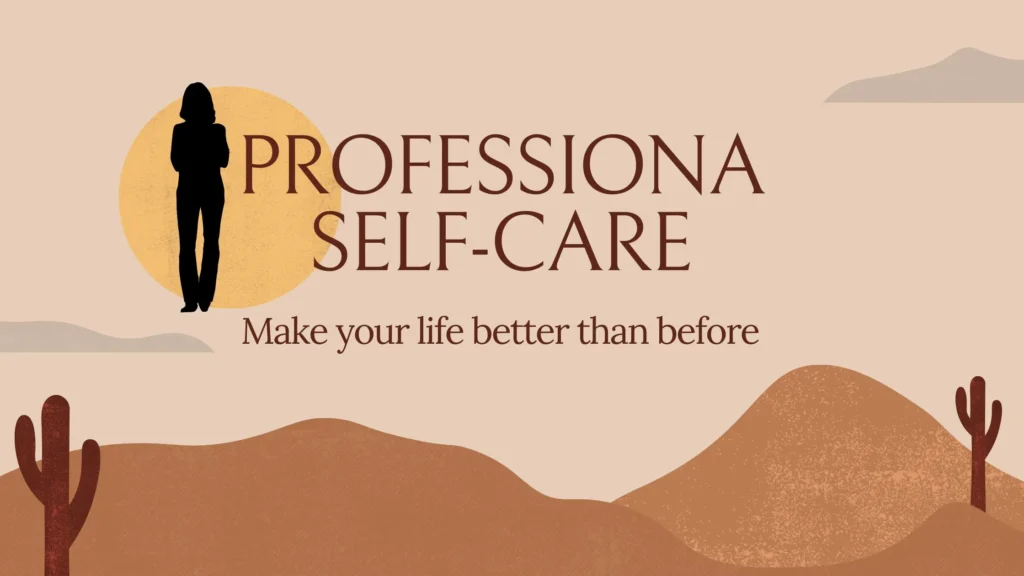
Yes, that’s correct! Professional self-care is an important aspect of self-care that involves taking care of yourself in the workplace.
Examples of professional self-care activities include setting boundaries and saying no to excessive work demands, taking regular breaks to rest and recharge, seeking support from colleagues or supervisors when needed, engaging in activities that promote work-life balance such as exercise or hobbies outside of work, and pursuing professional development opportunities such as training or workshops.
Professional self-care is important because the workplace can be a source of stress and burnout, and neglecting self-care in this area can have negative impacts on both your physical and mental health. By prioritizing professional self-care, you can improve job satisfaction, increase productivity, and reduce stress and burnout. Additionally, pursuing professional development opportunities can help you stay current in your field, enhance your skills and knowledge, and increase your job satisfaction.
Incorporating professional self-care into your routine can be a powerful way to take care of yourself in the workplace and enhance your overall well-being. By setting boundaries, taking breaks, and pursuing professional development, you can maintain a healthy work-life balance and promote job satisfaction and career success.
Remember, self-care is not a one-size-fits-all approach, and what works for one person may not work for another. It’s important to experiment with different self-care practices and find what works best for you.
Absolutely! Self-care is a highly individualized practice and what works for one person may not work for another. It’s important to explore different self-care practices and experiment with different approaches to find what works best for you.
It’s also important to recognize that self-care is not a one-time event, but rather an ongoing practice that requires consistent effort and attention. Incorporating self-care into your daily routine can help you maintain balance, manage stress, and promote overall well-being.
Remember that self-care is not selfish or indulgent, but rather a necessary practice for maintaining physical, mental, and emotional health. Prioritizing self-care can also have positive impacts on your relationships, work, and other areas of your life.
So, take some time to reflect on what self-care practices resonate with you and make a commitment to prioritize self-care in your daily routine. By doing so, you can cultivate greater self-awareness, resilience, and overall well-being.
